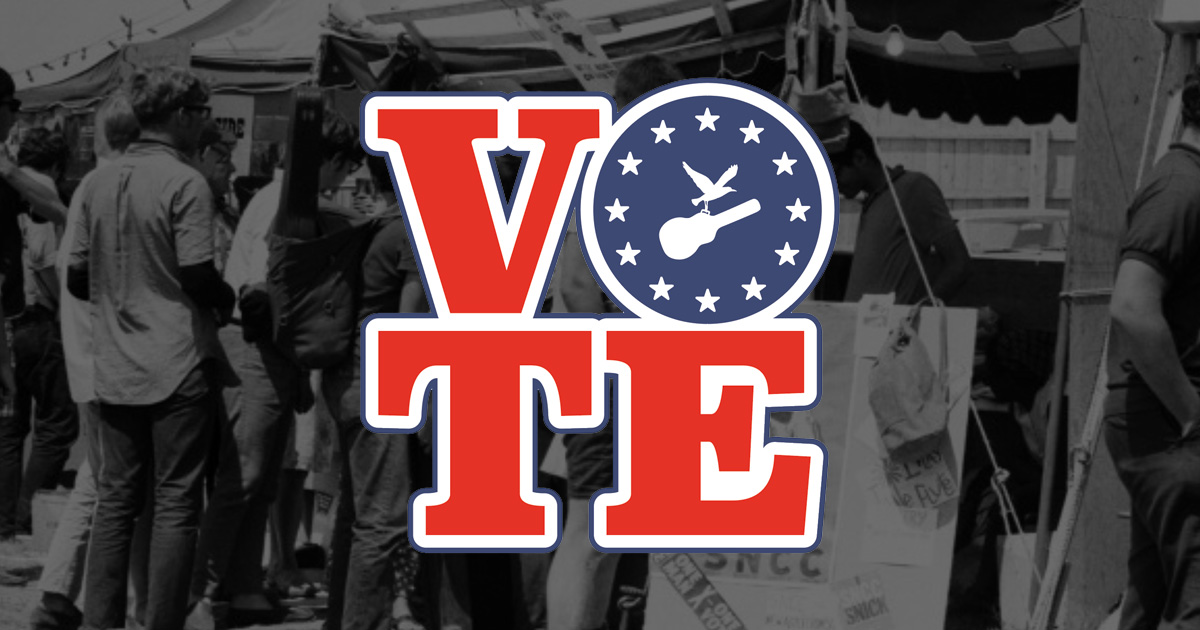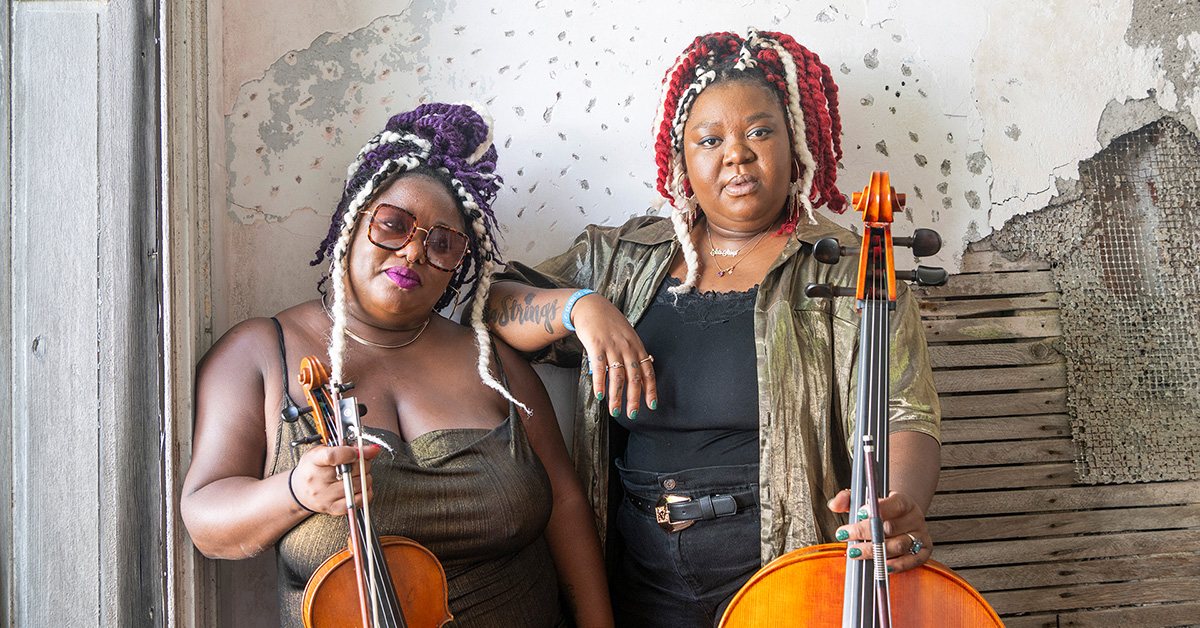
Piecing Together The Poetry Of Joan Baez
Some people lasso you into their aura quickly and make you spellbound, and few do it with such alacrity as the legend, icon, singer, filmmaker, poet, artist, and kind human known as Joan Baez. Each moment with her is like stepping into one of her pieces, beautiful, soaring, alluring but always with a mischievous sense of purpose ready to pounce. Still spry and brimming with wit, she agreed to a conversation to discuss collaboration, community, and the multiple personalities that contribute to her poetry.
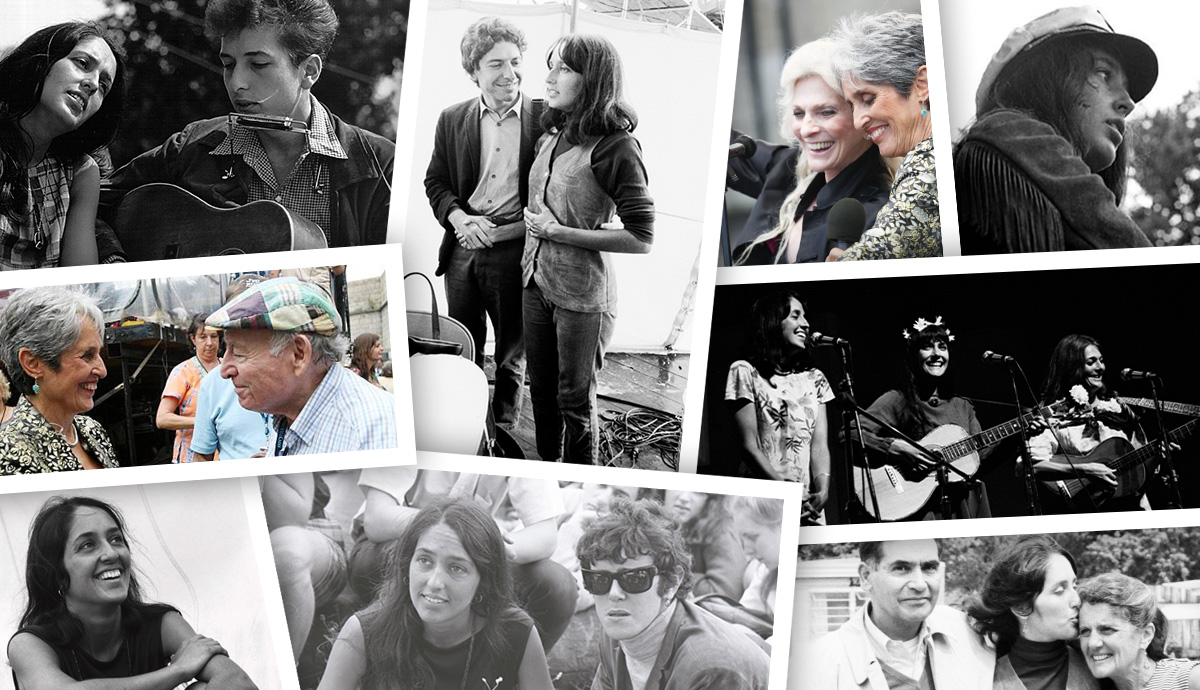
Joan Baez: That is correct!
JS: An artist, Bob Gibson, invited you to the first Newport Folk in 1959. Recently, we’ve seen you with Newport Folk family of artists of all generations – Judy Collins, Allison Russell, Jack White, Lucy Dacus, Phoebe Bridgers – sharing moments on and off stage and connecting over music and causes. Why is connecting, artist to artist, and uplifting other musicians still important today? Just like Bob did with you in 1959.
JB: It’s probably more important. You know I feel fortunate, I have a 20 year old granddaughter who actually was instrumental in connecting me to a couple of youngsters. Like Lana Del Rey asked if I would sing with her. And it’s interesting because some of these people are not particularly political. But I think they have their own message to bring thats usually about families, about sexual situations, about suicide. These young artists are an interesting lot, and I’ve appeared in their music, but as far as getting too political, it’s hard to do that right now. Their songs are… I mean, what’s missing is the anthems that bring everyone together. There are people out there. The most obvious young person is Brandi Carlile because she took something by the horns and just ran with it, trying to connect us all.
JS: I couldn’t agree more. Brandi has been a generous collaborator of mine from bringing everyone from Dolly Parton to Chaka Khan to Joni Mitchell, and of course connecting them with a slew of younger musicians as well. I have learned so much from working with Brandi. We’ve done it on and off since 2008. We’ve had a pretty good run and you nailed it. Seemingly, her internal mission is to try to connect the artistic dots and honestly it means the world to me.
JB: If you see her, let her know I feel the same way.

photo by Jim Marshall
JS: Could you tell us the story behind this photo?
JB: I don’t remember how that moment started. I don’t know if I was going to the laundromat or running an errand, but I ended up with all of these people. We just got together and kept walking. We didn’t have a particular goal that day, other than to highlight civil rights. I look at the picture and I figure that I’m singing Don’t Let Nobody Turn You Around, which has stayed with us over the years, that song…
JS: That’s amazing. I believe my job, at its essence, is to create a safe space for the artists to do what they do. In the live music duopoly of Live Nation and AEG, I think Newport still stands alone, an independent, nonprofit that delivers hundreds of thousands of dollars each year back into music education. You were at the first Newport Folk and you were also at my first full Newport Folk, which was the 50th. Now as we begin our 65th year, what do you think Newport still means to you?
JB: Well it’s just the entirety of what you just said. I did an interview yesterday with Ed Norton, who’s playing Pete Seeger in the Dylan film that’s being made now. We talked about why I was attracted to Pete Seeger, not just for his music, but because of his priorities. I heard this story of how he was busy putting shingles on his roof and something like CBS Morning News was down below waiting for him to do an interview, but he wouldn’t come down until he was done. His roof was more important. Newport is just like that. It’s about the opposite of stardom, the opposite of AI, it has its priorities straight. I remember people asking me why I didn’t go into opera. And back then, I just felt my feet were more comfortable in the dirt than they were on the stage. Newport remains rooted. It stands firm in the midst of this chaos that’s flying by so fast you can’t even think straight sometimes. Newport gives you a chance to sit down, shut up, listen, and appreciate.
JS: That’s my favorite pull quote right there. “Shut up and listen.” I appreciate that. So much of the music that I’m drawn to is about collaboration, gathering, and communing… With social media and the internet, people think they’re communing, but they’re not, because they’re not vibrating at the same frequencies that they sustain when they’re physically in the same place with other people. The sense of collective power comes from sharing strong feelings towards one injustice or another, looking around at a large group of people and realizing you’re not alone in your beliefs and feelings. I’m just curious, I know this is kinda a weird one and you might not have an answer, but as an artist, what defines an idyllic oasis or safe space? And, what can I do or should be particularly aware of to protect this safe space from your perspective.
JB: I think you’re doing it.
JS: I appreciate that.
JB: No, seriously. That’s how I would answer. In your sphere, in your stratosphere, you’re doing exactly what some sane, intelligent and decent human being should be doing. You’re a great example.
JS: I appreciate that. I’m now blushing.
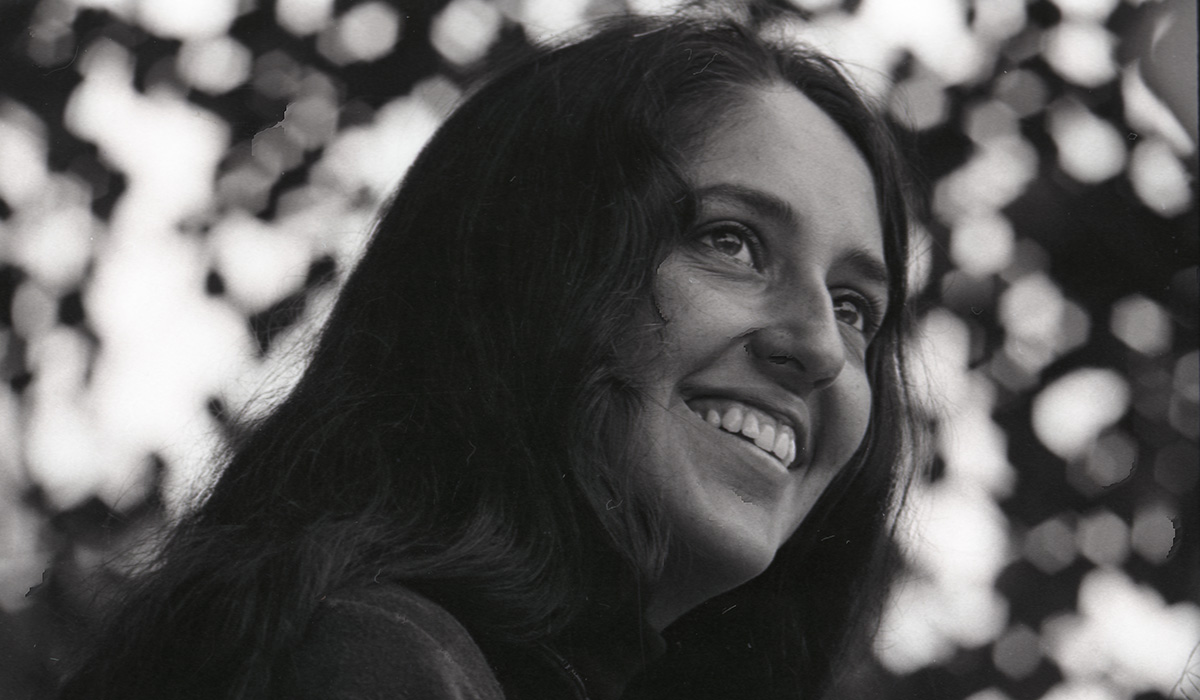
photo by David Gahr
JS: Let’s get to the last few questions. In 1959, Newport Folk hosted a variety of workshops on site at the Festivals. Today, the Newport Festivals Foundation provides artist and music education programs – like free music lessons, instrument donations, and artist relief grants. What did music education mean to you before you showed up at Newport?
JB: Well, my history is a little quirky because I didn’t have any music education. I’m just fortunate enough to have this voice, so I didn’t study or do anything formal at all. I just started. What I did that led to me being at Newport was sit around in coffee shops and ask people to show me what they’re doing. That was my education, learning by doing. Some people you’ve never heard of and some like Eric Von Schmidt and Debby Green, they were playing this amazing stuff and I just grabbed them and said, “What are you doing there?” And they showed me. That’s how I learned.
JS: Again, it’s about the community aspect of it. You felt comfortable enough to go into a coffee shop, which at that time, were spaces that allowed people who might not be fitting a “normal” way of life to find other outliers, or what I like to call, islands of misfit toys. These little oases where the misfits live is where you discover things. I like to haunt the places where the characters of great novels that were never written hide out. That’s what I like.
JB: I call them the pockets of sanity.
JS: I like that.
JB: The greatest quote I have from somebody who absolutely lived outside of all the norms and expectations of modern, clothed civilization was an old guy, a Russian-Jewish immigrant, and he was an artist and a painter and he had a reputation for doing his own absurd thing. He went into a coffee shop on Cannery Row and he stuck his head in and said, “Anybody got any questions for my answers?” [laughs] which I just love. There aren’t people like that around much anymore.
JS: Agreed. I’m only 53, but I spent so many years “on the road” before the internet existed, and I always say I learned more with my thumb out, hitchhiking, following the Grateful Dead, taking jobs in Jackson Hole or in Big Sur or in Portland, Maine than I ever learned in any school building.
JB: That’s correct. I really didn’t learn much of anything in school. Really, the luckiest you can get in school is finding a teacher you think is wonderful and turns you onto something. It could be anything, it could be math, it could be art, it could be the gym. It’s the teacher that makes you think like, “Aw, great, here I am” and you just go for it. And maybe there’s one in your lifetime that makes the difference, but that’s what school is to me; that’s the best possible thing that could happen in the schools.
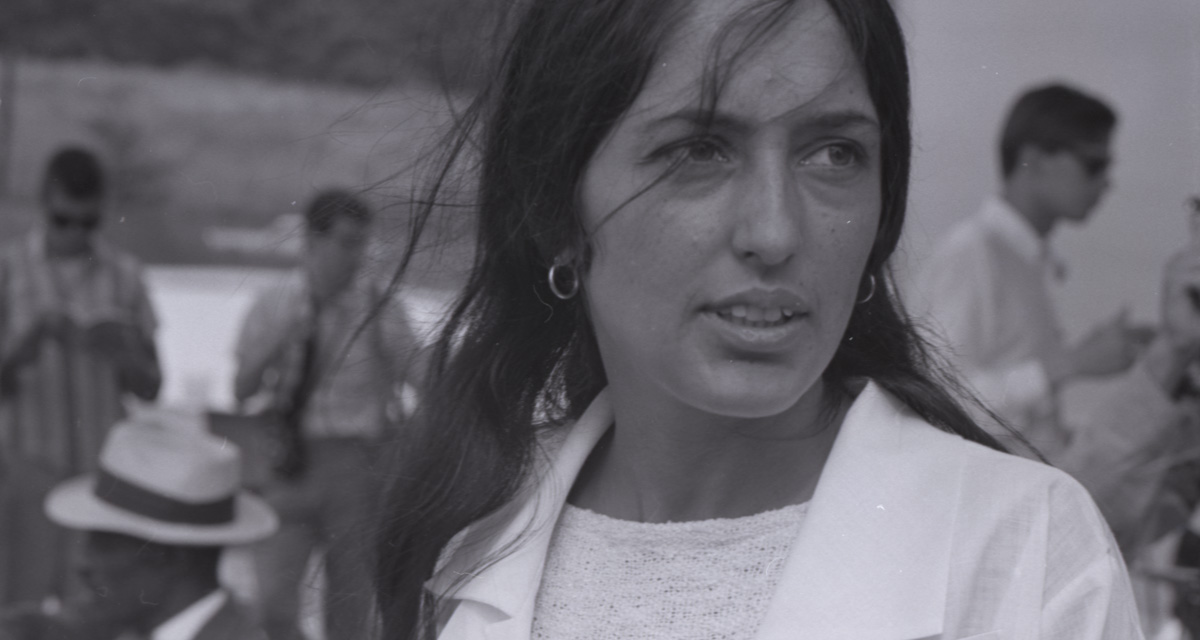
photo by David Gahr
JS: Well, you fell perfectly into my last question. I found one of those teachers in college who turned me on to poetry which led to me making it my major. So as one poet to another, you have written what looks like an incredibly titled poetry book When You See My Mother, Ask Her to Dance. Why poetry and why now?
JB: The poetry comes from a period in my life when I had been – to make this short & sweet – diagnosed with multiple personalities. They, basically, did the writing or heavily influenced whatever I was writing. So this poetry gives credit to some of the, whatever you wanna call them, inner people or alters, and it is the best poetry that ever came out of me. Ever. I wanted to do a poetry book and I realized that I was not writing as well as I thought I could. I looked back and realized the best of my writing was done between 1991 and 1998. It was basically written by “somebody” else. I picked out these scraps of paper all over the house, and went through storage, got my assistant to go through boxes, and piece this thing together. I did the editing. Like the title poem, it started off as a short one and then I got it going and it became longer. That’s really where this little book comes from, the older poems that grew into what they are now. It’s me – actually, the folks within me – wanting to have their moment in the sun. So that’s how that book came together.
JS: I love and adore that. I actually recently read some poetry I wrote between 1989 and 1993 and it was as if I was reading an old relative of mine’s poetry. I didn’t recognize myself, but I knew there was a familial connection, if that makes any sense.
JB: It makes plenty of sense.
